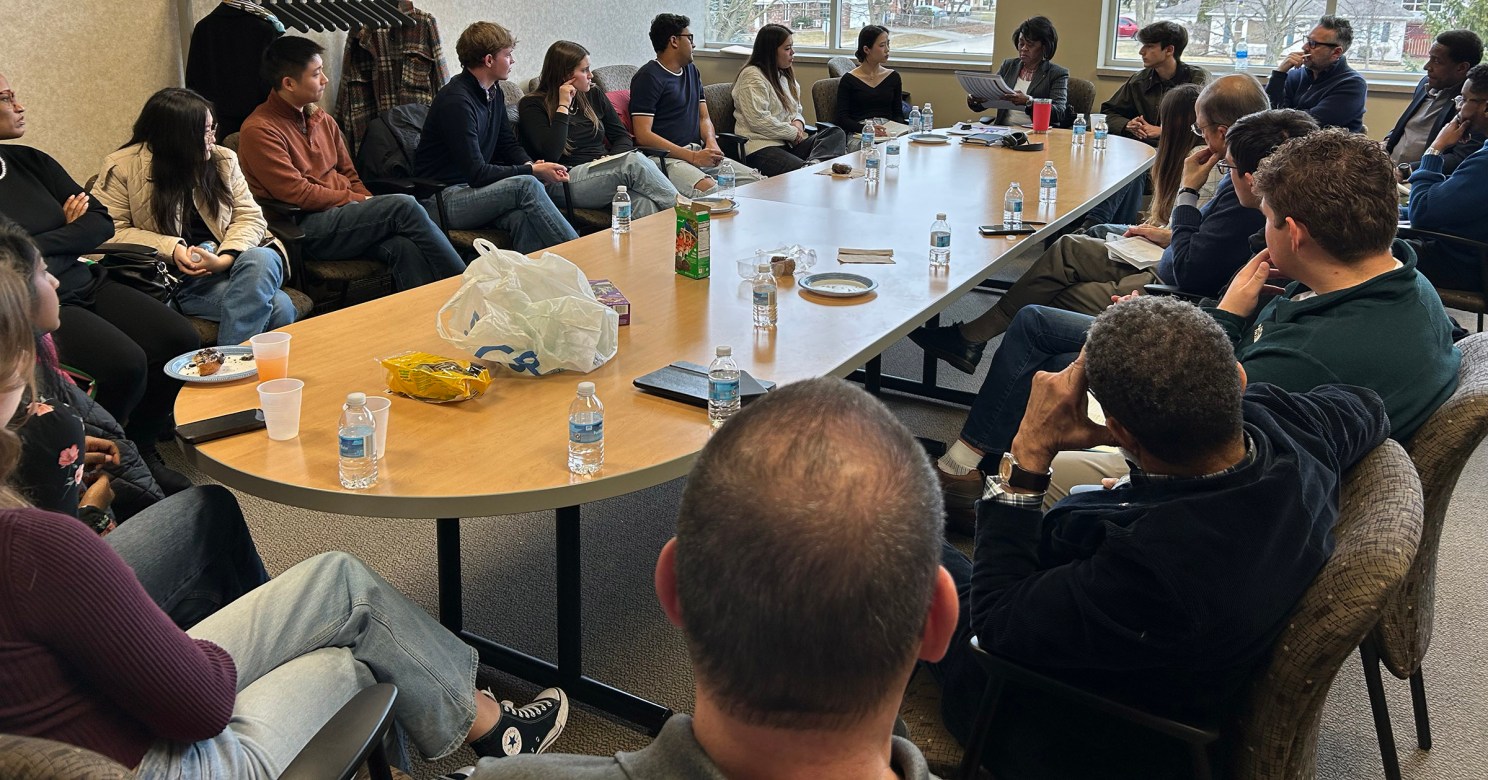Top issues for young voters? Stories from a swing state.

While in Michigan, students from the Harvard Public Opinion Project met with local political activist and City Council candidate Jocelyn Howard.
Harvard student pollsters talk to peers in Michigan about money, mental health, and other worries
Harvard student pollsters got a close look at the hopes, struggles, and fears of fellow young voters during a recent trip to the swing state of Michigan.
Twice a year through the Harvard Public Opinion Project, students conduct a sweeping poll on the political opinions and beliefs of Americans aged 18 to 29. The Harvard Youth Poll surveys 2,000-2,500 people each semester, with students creating the questions and evaluating the data.
In addition, every four years, a select group visits a battleground state to gather stories that give context to those numbers. To that end, 16 students visited Michigan last month to conduct focus groups and connect with peers on the issues they care about most.
“I was really struck by — not just in our focus group, but in our discussions with the community at large — people’s concern for the future and long-term planning,” said project chair Anil Cacodcar.
Like many Harvard students, the 25 or so focus group members were worried about student debt relief, helping their parents retire, and being able to retire themselves someday.
“You can’t help but think about how so many social issues are inextricably linked to economic issues,” Cacodcar said. “We had one young lady in our focus group whose top issue in the 2024 election was having the right to an abortion. She added the caveat that, well, ‘How can I think about voting about abortion when I can’t afford rent or can’t pay my bills?’”
Cacodcar, a sophomore from Lafayette, Louisiana, who lives in Cabot House and studies economics and human developmental and regenerative biology, said the trip helped bring to life issues that every young person is facing.
That peer-to-peer aspect is key, says project founder John Della Volpe, director of polling at the Kennedy School’s Institute of Politics.
“That’s the secret sauce of this entire thing,” he said. “We’re trying to develop questions that speak to this moment. So they’re coming in with the issues that in many ways are the very same issues or concerns that affect other young people regardless of where they live.”
“We had one young lady in our focus group whose top issue in the 2024 election was having the right to an abortion. She added the caveat that, well, ‘How can I think about voting about abortion when I can’t afford rent or can’t pay my bills?’”
Anil Cacodcar, Harvard Public Opinion Project
Another issue that kept coming up was the youth mental health crisis.
“We find that half, 50 percent or so, of this generation say they have felt depressed several days in the last two weeks, 25 percent or half of that number say it’s so bad that they’ve considered self-harm,” Della Volpe said. “We’re understanding that the political divisions in our nation are making young people sick.”
Cacodcar added that the pandemic is possibly a factor.
“People feel, as one participant worded it very poignantly, that they’ve been robbed of their 20s because of the pandemic,” he said. “Having such a formative time of your life changed is a very difficult thing.”
As for how the students will use what they learned in Michigan in their next poll, Della Volpe said that the anecdotes gathered help them “share the humanity behind the numbers.”
“Public opinion research is art and science,” he said.
While students learn the science from their other professors, like Chase Harrison, who teaches research methodology, Della Volpe tries to help with the art.
“I’ve tried to instill in the young people that curiosity,” he said. “The art of asking the right questions. If one student asks one question over four years that changes a narrative or changes the way we think about things — that’s incredibly successful.”
A recent example, Della Volpe said, was a question the team asked about a year ago that uncovered that roughly a third of respondents overall, and close to 50 percent of the people of color polled, feared they could one day be homeless.
That led students to form a research team focused on housing issues. They were invited just last month to the Roosevelt Room to brief the president’s senior staff on their findings. Public Opinion Project students have shared their research in the Oval Office, Brookings Institution, National Press Club, and more. Over the summer they will travel to both the Republican and Democratic conventions to conduct research and share findings.
“Something that I was surprised by, and my biggest takeaway from the weekend, is just the immense power of anecdotal evidence,” said Cacodcar. “And not just that, but the power of a really good story.”




